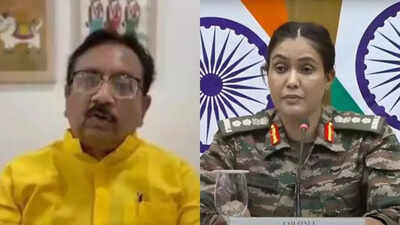The Supreme Court of India has come hard on Madhya Pradesh minister Vijay Shah for his controversial comments on Colonel Sofiya Qureshi, a highly respected officer of the Indian Army. The court's reaction, including directing a Special Investigation Team (SIT) inquiry, reflects the seriousness of the issue and the necessity for responsibility in public statement.
The Controversial Remarks
Vijay Shah, a minister in the Madhya Pradesh government, made remarks that were widely condemned as derogatory and inappropriate, particularly given Colonel Sofiya Qureshi’s role in Operation Sindoor, a military operation against Pakistan. His comments sparked outrage across the country, leading to legal scrutiny and widespread criticism.
Supreme Court’s Response
The Supreme Court minced no words in its condemnation of Shah's comments. A bench headed by Justices Surya Kant and N Kotiswar Singh voiced severe concern over the comments of the minister, terming them as an embarrassment to the whole country. The court dismissed Shah's apology as insincere and lacking, and reiterated that public figures have the responsibility and need to be careful with their words.
Formation of SIT Probe
Realizing the gravity of the situation, the Supreme Court ordered the government of Madhya Pradesh to set up an SIT to probe the case. The three-member team, comprising senior IPS officers from other states, including a female officer, has been assigned to hold a thorough investigation and file a status report by May 28. The court also put Shah's arrest on hold but clarified that the inquiry must go on without any political intrusion.
Political and Social Consequences
The episode has evoked a wider discussion regarding the responsibility of public functionaries and how the words of public figures affect national honor. Most political figures and social workers have denounced Shah's words as an affront to the nation and demanded the implementation of stricter controls to avoid such episodes in the future. The scandal also reflects on the need for upholding respect for the military and for ensuring that political discourse does not decrease this respect.
Conclusion
The Supreme Court's intervention here sends out a signal that public figures will be held accountable for their words. By directing an SIT inquiry and dismissing a half-hearted apology, the court has given strength to the principle that respect for the armed forces and responsible speech are not negotiable. The country will keenly await how justice is delivered in this case as the probe proceeds.


Comments
Post a Comment